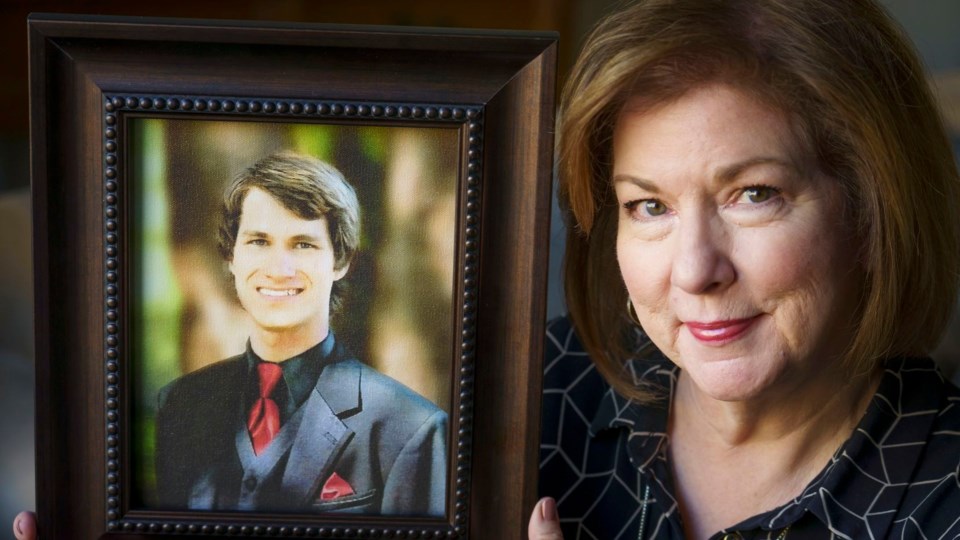When a school counselor called Vanita Halliburton to tell her that her son was cutting, she thought he was cutting school. “I mean I was clueless about what she was talking about,” she says. “And I said, ‘I don’t understand.’ And she said, ‘It’s a kind of self-harm. He’s cutting his wrists.’”
That was in 2000 when her son, Grant, was in eighth grade and at the beginning of the millennium, not a lot of people were talking about mental illness.
“I [didn’t] want [people] thinking he’s mentally ill,” says Halliburton, who lives in Plano.
Because of the stigma surrounding it, Halliburton wasn’t sure who to ask for help. She only knew one therapist and immediately called her. That therapist ended up diagnosing Grant with chronic depression and helping him for five years. “It’s the deal about you can ask anybody for a referral to a dentist, but you can’t ask the PTA president for a counselor for your child,” she says.
But when Grant came home from college in Austin his freshman year, Halliburton was once again stumped. “Mom, I don’t think I can lead a normal life if I don’t get some serious help,” he told her.
Halliburton began asking around and found a psychiatric treatment center where Grant was diagnosed with bipolar disorder 1 with psychosis. He stayed there for 30 days and when he returned home, Halliburton says her son wasn’t acting like himself — almost like a “shell of himself.”
She thought it was his new medication.
“I feel like at the end of 30 days, I think he told them what they needed to hear, so they would discharge him, and I think he felt in his mind that he had given us all a chance,” she recalls.
Two weeks later, Grant died by suicide. He was one of 132 people who die by suicide every day in the U.S., the American Foundation for Suicide Prevention reports. Suicide is the 10th-leading cause of death for all age groups and, in 2017, the second leading cause of death for ages 10 – 24, according to the Centers for Disease Control and Prevention.
Shortly after their son’s death, Halliburton and Grant’s father started the Grant Halliburton Foundation to help end the stigma surrounding mental illness. The foundation will host its 11th annual Beacon of Hope Community Luncheon at 11 a.m. March 10 at the Omni Hotel in Dallas. Former U.S. Rep. Patrick Kennedy, nephew of John F. Kennedy and author of A Common Struggle, is the keynote speaker.
“Stigma keeps people silent,” Halliburton says. “Stigma keeps young people from feeling like they can speak up when they’re hurting. Stigma keeps people from feeling like they can ask somebody how to even find mental health help. Stigma is the number one problem. There hasn’t been a medical illness with this kind of stigma since breast cancer 35 years ago.”
As part of the foundation’s work, Halliburton speaks to students, teachers, working professionals, and more on the risks of stress and depression. She informs her audience the need for a quality night of sleep, a healthy diet and dose of exercise, and how to manage stress. These things, she says, can help people avoid ending up like her son.
In the Dallas office of the Grant Halliburton Foundation, Grant’s artwork, poems, and diary entries line the hallway. “He was very creative, he was very outgoing, he experienced life to the fullest,” Halliburton recalls. “I always say, it was if his brain had receptors open to the universe. He was so creative, so funny, that it would have been hard for me to say, ‘I think he’s struggling with depression or something.’”
There’s a diary entry from 16-year-old Grant explaining the night he ran away with his girlfriend. Halliburton says that’s just one example of the kind of risky behavior he started to dabble in when he was in high school — something they later found out could be attributed to bipolar disorder 1. According to the National Institute of Mental Health, people with bipolar disorder can “do risky things that show poor judgment such as eat and drink excessively, spend or give away a lot of money, or have reckless sex.”
The Grant Halliburton Foundation does a lot to fight mental illness. There’s the website herefortexas.com, which is a database of more than 800 mental health providers for people looking for help. The foundation has programs like Dad2Dad, a breakfast series for dads of a teen or young adult who might be struggling with mental illness. Coffee Days is a similar support group for women.
At Tuesday’s Beacon of Hope Luncheon, the Foundation will help “bring focus to the vital work needed to educate the North Texas community on adolescent mental health and suicide prevention,” according to the press release
“If we couldn’t figure this out and we were working as hard and as fast as we could to figure out the next thing for (Grant), there must be other families who can’t figure this out either,” Halliburton says.
“Every young person deserves health and hope.”




